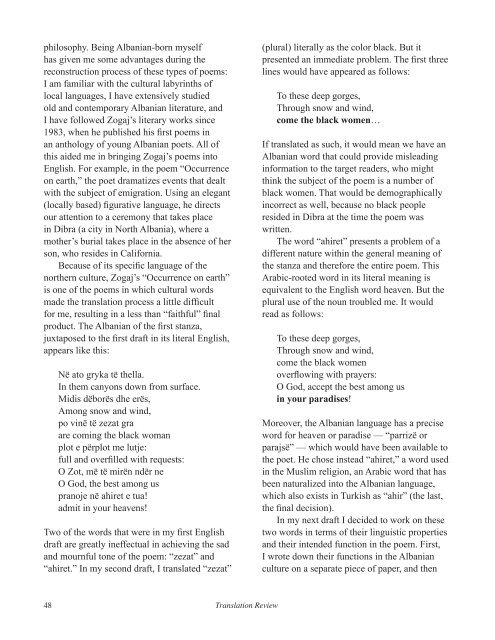Table of contents - The University of Texas at Dallas
Table of contents - The University of Texas at Dallas
Table of contents - The University of Texas at Dallas
You also want an ePaper? Increase the reach of your titles
YUMPU automatically turns print PDFs into web optimized ePapers that Google loves.
philosophy. Being Albanian-born myself<br />
has given me some advantages during the<br />
reconstruction process <strong>of</strong> these types <strong>of</strong> poems:<br />
I am familiar with the cultural labyrinths <strong>of</strong><br />
local languages, I have extensively studied<br />
old and contemporary Albanian liter<strong>at</strong>ure, and<br />
I have followed Zogaj’s literary works since<br />
1983, when he published his first poems in<br />
an anthology <strong>of</strong> young Albanian poets. All <strong>of</strong><br />
this aided me in bringing Zogaj’s poems into<br />
English. For example, in the poem “Occurrence<br />
on earth,” the poet dram<strong>at</strong>izes events th<strong>at</strong> dealt<br />
with the subject <strong>of</strong> emigr<strong>at</strong>ion. Using an elegant<br />
(locally based) figur<strong>at</strong>ive language, he directs<br />
our <strong>at</strong>tention to a ceremony th<strong>at</strong> takes place<br />
in Dibra (a city in North Albania), where a<br />
mother’s burial takes place in the absence <strong>of</strong> her<br />
son, who resides in California.<br />
Because <strong>of</strong> its specific language <strong>of</strong> the<br />
northern culture, Zogaj’s “Occurrence on earth”<br />
is one <strong>of</strong> the poems in which cultural words<br />
made the transl<strong>at</strong>ion process a little difficult<br />
for me, resulting in a less than “faithful” final<br />
product. <strong>The</strong> Albanian <strong>of</strong> the first stanza,<br />
juxtaposed to the first draft in its literal English,<br />
appears like this:<br />
Në <strong>at</strong>o gryka të thella.<br />
In them canyons down from surface.<br />
Midis dëborës dhe erës,<br />
Among snow and wind,<br />
po vinë të zez<strong>at</strong> gra<br />
are coming the black woman<br />
plot e përplot me lutje:<br />
full and overfilled with requests:<br />
O Zot, më të mirën ndër ne<br />
O God, the best among us<br />
pranoje në ahiret e tua!<br />
admit in your heavens!<br />
Two <strong>of</strong> the words th<strong>at</strong> were in my first English<br />
draft are gre<strong>at</strong>ly ineffectual in achieving the sad<br />
and mournful tone <strong>of</strong> the poem: “zez<strong>at</strong>” and<br />
“ahiret.” In my second draft, I transl<strong>at</strong>ed “zez<strong>at</strong>”<br />
(plural) literally as the color black. But it<br />
presented an immedi<strong>at</strong>e problem. <strong>The</strong> first three<br />
lines would have appeared as follows:<br />
To these deep gorges,<br />
Through snow and wind,<br />
come the black women…<br />
If transl<strong>at</strong>ed as such, it would mean we have an<br />
Albanian word th<strong>at</strong> could provide misleading<br />
inform<strong>at</strong>ion to the target readers, who might<br />
think the subject <strong>of</strong> the poem is a number <strong>of</strong><br />
black women. Th<strong>at</strong> would be demographically<br />
incorrect as well, because no black people<br />
resided in Dibra <strong>at</strong> the time the poem was<br />
written.<br />
<strong>The</strong> word “ahiret” presents a problem <strong>of</strong> a<br />
different n<strong>at</strong>ure within the general meaning <strong>of</strong><br />
the stanza and therefore the entire poem. This<br />
Arabic-rooted word in its literal meaning is<br />
equivalent to the English word heaven. But the<br />
plural use <strong>of</strong> the noun troubled me. It would<br />
read as follows:<br />
To these deep gorges,<br />
Through snow and wind,<br />
come the black women<br />
overflowing with prayers:<br />
O God, accept the best among us<br />
in your paradises!<br />
Moreover, the Albanian language has a precise<br />
word for heaven or paradise — “parrizë or<br />
parajsë” — which would have been available to<br />
the poet. He chose instead “ahiret,” a word used<br />
in the Muslim religion, an Arabic word th<strong>at</strong> has<br />
been n<strong>at</strong>uralized into the Albanian language,<br />
which also exists in Turkish as “ahir” (the last,<br />
the final decision).<br />
In my next draft I decided to work on these<br />
two words in terms <strong>of</strong> their linguistic properties<br />
and their intended function in the poem. First,<br />
I wrote down their functions in the Albanian<br />
culture on a separ<strong>at</strong>e piece <strong>of</strong> paper, and then<br />
48 Transl<strong>at</strong>ion Review

















